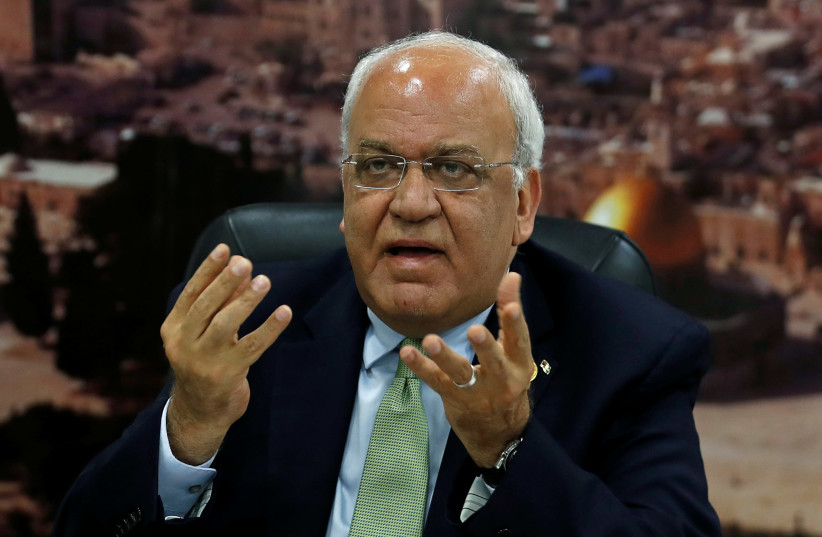Senior Palestinian leaders held a summit on September 30, to discuss ways to bypass or reverse EU rules banning funds being paid out to NGOs with terror ties.
By DONNA RACHEL EDMUNDS, JPOST
Chief Palestinian Negotiator Saeb Erekat gestures as he speaks to the media in Ramallah, July 1, 2019
Palestinian Foreign Ministry officials have convened with representatives of Palestinian factions, civilian organizations, and prisoners organizations to discuss ways to remove terror organizations from the European Union’s lists of restrictive measures. The listing is significant as the EU cannot pay out funds to NGOs who have ties to the terror groups on the lists, or who refuse to sign.
According to a statement on the official news-site of the Palestine Liberation Organization (PLO), the meeting, chaired by Secretary General of the Executive Committee of the PLO, Dr. Saeb Erekat, focused on the need to preserve a relationship with the EU while at the same time rejecting the terrorist label attached to the factions and the need to comply with that designation to access the funding.
The attendants also unanimously agreed to reject conditional funding.
ANNEX II of the general conditions attached to EU grants includes a stipulation, Article 1, 1.5bis, which states: “Grant beneficiaries and contractors must ensure that there is no detection of subcontractors, natural persons, including participants to workshops and/or trainings and recipients of financial support to third parties, in the lists of EU restrictive measures.”
Several Palestinian terror groups appear on these lists, including Palestinian Islamic Jihad (PIJ), the Popular Front for the Liberation of Palestine (FPLP), and Hamas, among others. 130 Palestinian NGOs have refused to sign the clause, however, insisting that the stipulation amounts to illegal interference in Palestine’s political process by outside bodies, as the terror groups in question are “political parties.” In late December 2019 they launched a “Palestinian National Campaign to Reject Conditional Funding.”
In June, the EU withdrew funding for at least one Palestinian NGO, BADIL, after it refused to sign the anti-terror clause. In total, the NGO lost out on €1.7 million in funding which had been allocated for a three-year project titled ‘Mobilizing for Justice in Jerusalem.’ The NGO explained their decision not to sign by stating that the clause amounted to the “acceptance and adoption of the allegations of the Zionist lobby and Israeli campaigns,” with the aim of “criminalizing the Palestinians struggle.”
That decision was made after pressure was brought to bear on the EU’s leadership, in part by think tank NGO Monitor. Vice President of NGO Monitor, Olga Deutsch told The Jerusalem Post: “We have for years called attention to the lack of independent human rights advocates within Palestinian civil society, a sector which has instead been hijacked by radical actors, including internationally banned terror groups like the PFLP.
“Worse, rather than using the EU rules as an opportunity to rehabilitate the NGO sector, the Palestinian government has doubled down – as a matter of national priority – to bypass international standards and keep foreign funds flowing into another para-governmental branch that opposes any notion of coexistence or peace, including to groups closely linked to violent terror elements.”
Activity on this front had fallen quiet over the summer. However, those at the meeting have decided to try to bring pressure to bear on parliaments worldwide in order to reinstate the flow of funding into the NGOs.
The meeting, which took place on September 30 in Ramallah, drew the attention of Israel’s Ministry of Strategic Affairs, which has distributed a briefing document to a number of government and security officials, detailing this latest development. That document also noted that, alongside bringing pressure to bear on the EU to reverse their decision, those present discussed ways to oppose campaigns organized by “Zionist lobby” groups, whose purpose, they say, is to delegitimize elements of Palestinian society.
“To our understanding, the meeting led by Erekat is intended to send a message to the Palestinian factions, led by Hamas, as well as to civil society organizations, that the PA stands by them in the fight against the EU on the issue of funding conditions,” the briefing document noted.
Minister of Strategic Affairs, Orit Farkash-Hacohen, commented: “In recent months, the European Union has been under pressure to change its policy regarding the transfer of funds to Palestinian organizations. The Union’s decision not to withdraw from its policy is welcome and important in distinguishing between legitimate civic activity and supporting and promoting terrorist activity.
“I call on the countries of Europe to adopt the standard of the Union as well, and not to give a hand to those who pressure them to repeal this clear rule. The tax money of European citizens should not fund those who support terrorism, directly or indirectly.”
Jerusalem Post Staff contributed to this report.
<
>
<
>




Harvard Univ. has invited Erekat for a position in their Alma Mater!